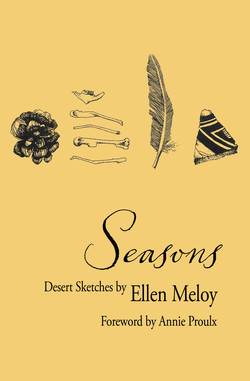Читать книгу Seasons - Ellen Meloy - Страница 8
На сайте Литреса книга снята с продажи.
ОглавлениеForeword
Naturalist and environmental writer Ellen Meloy, who died in 2004, loved the huge red rocks of the Four Corners region where Utah, Colorado, New Mexico, and Arizona come together in a dusty knot, a region of Navajo and Hopi languages and cultures with some of the most profound land views in North America. Her witty, freewheeling essays on the imbalance between humans and nature lightened up the Cassandra genre known as “environmental literature.” Verlyn Klinkenborg, in an obituary remembrance, quoted her as saying that much nature writing “… sounds like a cross between a chloroform stupor and a high Mass.”1 She had the rare gift of seeing humor in the wild world and in our attempts to know it. She was a master of the telling phrase as when she described her place as “a tiny town in a land that looks like red bones” and commercial airliners as “flying culverts.” She gave advice about toads: that we should not carry them around and “When you think about licking them, change your mind.” She was curious about all landscapes and told her readers that when they were in new country they should pay attention and “ask why people call their landscape home, what they love or fear, what is blessed, what is destroyed.” She often urged her readers and listeners to understand their biological addresses, to count the local wildlife, animals, birds, and plants as neighbors. The twitches of weather and climate were important to her and she wanted us to observe and make notes of what was happening in our backyard worlds as William Bartram or Thoreau did. For years in the 1850s Thoreau noted the blossoming times of wildflowers around Concord in his now-famous journals. Today’s scientists used his meticulous data as evidence of climate change.2
Several of Meloy’s essays were instant classics. “Lawn” condenses everything into two fierce sentences: “Throw massive amounts of water and petrochemicals on your grassy plot, let it push up from the soil, then cut it down to nubs before it can grow up and have sex and go to seed. A lawn is an endless cycle of doomed ecology.” “Tourists in the Wild” lampoons New Yorkers lost in the terrifying Great West with a reference to bears, which we all know are spaced about twenty feet apart from the left side of the Rockies to the Pacific Ocean.
But her essays were not all wit and amusement. Some of the essays are less than benign, as “California” with its acid takeoff on the provocative bumper sticker “I’d rather be hunting and gathering” pasted on a luxe-mobile, or “Cracking Up” with its call to “small acts of defiance … against a suffocating culture of meaninglessness.” And she could fire off hard truths dipped in sarcasm, as in “Animal News,” which works up from an unnamed man’s statement that wolves should not be reintroduced in the West because, as he says pejoratively, “The wolf kills for a living,” to her point that we are “so estranged” from the lives of wild creatures that we offer them the choice of only living lives that suit us or dropping dead. Humans also are animals, she says—face it.
Some of the essays seem to have been written last week, so fresh are the topics. In November of 1996 Ellen Meloy was utterly sick of election jabber, of the inescapable faces on television and the incessant brainless repetitive rhetoric. “What,” she says, “has become of the honorable and decent public servant? You won’t find one in either political party, so kill your television.” And she turns hers off. One of her finest essays, “Bluff,” is about guns. The subject becomes important when “three anti-government extremists” who have killed a policeman in Colorado turn up not far from the Meloy place. Roadblocks, canine units, sheriffs and cops, and SWAT teams are everywhere. Her husband Mark has an old shotgun, but Ellen Meloy, who describes herself as a “token, squishy, white doughball of liberalism who still believed that if you hated government, maybe you should do something really radical to change things, like vote,” does not have a gun. Readers! Let that sink in. She lives in the West, the American West, and does not have a gun! Yet lives to tell about it.
In the end, what we take away from the essays of Ellen Meloy is her impassioned request to us all to regard what is around us. “Pay attention to the weather, to what breaks your heart, to what lifts your heart. Write it down.”
Amen, amen.
Annie Proulx
Port Townsend, Washington
1 https://www.nytimes.com/2004/11/11/opinion/ellen-meloy.html
2 Richard B. Primack, Walden Warming, U. Chicago Press, 2014.
